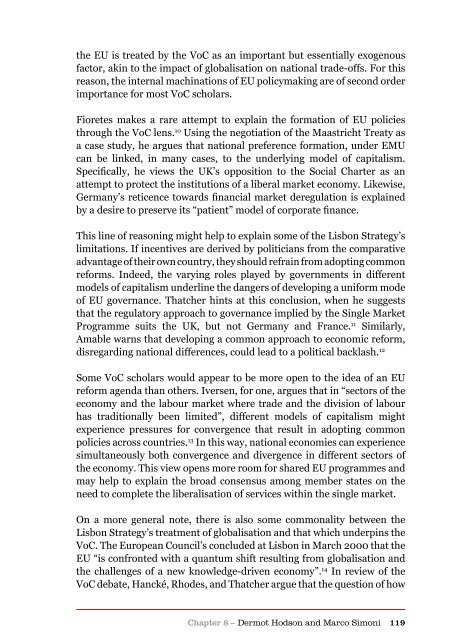Authors Iain Begg | Gabriel Glöckler | Anke Hassel ... - The Europaeum
Authors Iain Begg | Gabriel Glöckler | Anke Hassel ... - The Europaeum
Authors Iain Begg | Gabriel Glöckler | Anke Hassel ... - The Europaeum
Create successful ePaper yourself
Turn your PDF publications into a flip-book with our unique Google optimized e-Paper software.
the EU is treated by the VoC as an important but essentially exogenous<br />
factor, akin to the impact of globalisation on national trade-offs. For this<br />
reason, the internal machinations of EU policymaking are of second order<br />
importance for most VoC scholars.<br />
Fioretes makes a rare attempt to explain the formation of EU policies<br />
through the VoC lens. 10 Using the negotiation of the Maastricht Treaty as<br />
a case study, he argues that national preference formation, under EMU<br />
can be linked, in many cases, to the underlying model of capitalism.<br />
Specifically, he views the UK’s opposition to the Social Charter as an<br />
attempt to protect the institutions of a liberal market economy. Likewise,<br />
Germany’s reticence towards financial market deregulation is explained<br />
by a desire to preserve its “patient” model of corporate finance.<br />
This line of reasoning might help to explain some of the Lisbon Strategy’s<br />
limitations. If incentives are derived by politicians from the comparative<br />
advantage of their own country, they should refrain from adopting common<br />
reforms. Indeed, the varying roles played by governments in different<br />
models of capitalism underline the dangers of developing a uniform mode<br />
of EU governance. Thatcher hints at this conclusion, when he suggests<br />
that the regulatory approach to governance implied by the Single Market<br />
Programme suits the UK, but not Germany and France. 11 Similarly,<br />
Amable warns that developing a common approach to economic reform,<br />
disregarding national differences, could lead to a political backlash. 12<br />
Some VoC scholars would appear to be more open to the idea of an EU<br />
reform agenda than others. Iversen, for one, argues that in “sectors of the<br />
economy and the labour market where trade and the division of labour<br />
has traditionally been limited”, different models of capitalism might<br />
experience pressures for convergence that result in adopting common<br />
policies across countries. 13 In this way, national economies can experience<br />
simultaneously both convergence and divergence in different sectors of<br />
the economy. This view opens more room for shared EU programmes and<br />
may help to explain the broad consensus among member states on the<br />
need to complete the liberalisation of services within the single market.<br />
On a more general note, there is also some commonality between the<br />
Lisbon Strategy’s treatment of globalisation and that which underpins the<br />
VoC. <strong>The</strong> European Council’s concluded at Lisbon in March 2000 that the<br />
EU “is confronted with a quantum shift resulting from globalisation and<br />
the challenges of a new knowledge-driven economy”. 14 In review of the<br />
VoC debate, Hancké, Rhodes, and Thatcher argue that the question of how<br />
Chapter 8 – Dermot Hodson and Marco Simoni 119

















